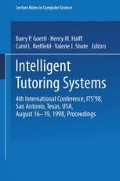Abstract
The authors describe work on the GRiP (Graphical Representations in Programming) Project1, which aims to build a support environment for novices learning to program using a visual programming language (VPL). The design of the environment is based on a series of experiments which investigate issues of visual programming language paradigm, and the ways in which novices extract information from a representation in order to make sense of a program. This paper focuses particularly on the multivariate nature of program comprehension, the difficulties associated with attempting to teach skills of this kind, and suggests a solution in the form of a modular support system.
Funded by EPSRC grants GR/L36987 and GR/L37045 and carried out in collaboration with Jon Oberlander and Richard Cox
Access this chapter
Tax calculation will be finalised at checkout
Purchases are for personal use only
Preview
Unable to display preview. Download preview PDF.
References
Pennington, N.: Comprehension Strategies in Programming. In: Olson, G.M., Sheppard, S., Soloway, E. (eds.): Empirical Studies of Programmers: Second Workshop. Ablex Publishing Corporation, New Jersey (1987a) 100–113 314, 314, 316, 316, 316, 317, 317
Corritore, C.L., Wiedenbeck, S.: What Do Novices Learn During Program Comprehension? International Journal of Human-Computer Interaction, 32 (1991) 199–222 314, 317, 317
Soloway, E., Adelson, B., Ehrlich, B.: Knowledge and Processes in the Comprehension of Computer Programs. In: Chi, M.T.H., Glaser, R., Farr, M.J. (eds.): The Nature of Expertise. Lawrence Erlbaum Associates, Hillsdale (1988) 129–152 314
von Mayrhauser, A., Vans, A.M.: Program Understanding — A Survey. Technical Report, Colorado State University. (1994) 314, 315
Tilley, S.R., Smith, D.B.: Coming Attractions in Program Understanding. Technical Report CMU/SEI-96-TR-019, Carnegie Mellon University. (1996). 315, 315
Green, T.R.G., Petre, M.: Usability Analysis of Visual Programming Environments: A Cognitive Dimensions Framework. Journal of Visual Languages and Computing 7 (1996) 131–174 318
Gilmore, D.J., Green, T.R.G.: Comprehension and Recall of Miniature Programs. International Journal of Man-Machine Studies 21 (1984) 31–48 319
van Dijk, T.A., Kintsch, W.: Strategies of Discourse Comprehension. Academic Press, New York. (1983) 317
Soloway, E., Jackson, S.L., Klein, J., Quintana, C., Reed, J., Spitulnik, J., Stratford, S.J., Studer, S., Jul, S., Eng, J., Scala, N.: Learning Theory in Practice: Case Studies of Learner-Centered Design. In: Bilger, R., Guest, S., Tauber, M.J. (eds.): CHI’ 96 Proceedings: Conference on Human Factors in Computing Systems: Common Ground. ACM. (1996). 322
Brna, P., Cox, R. Adding ‘Intelligence’ to a Learning Environment: A Case of Learner-Centred Design? Journal of Computer Assisted Learning. Accepted for publication in November/December 1998. 322
Davis, A.L., Keller, R.M.: Data Flow Program Graphs. IEEE Computer 1 (1982) 526–541 317
Green, T.R.G.: Cognitive Dimensions of Notations. In: Sutcliffe, A., Macaulay, L. (eds.): People and Computers V. Cambridge University Press, Cambridge (1989) 318
Sweller, J., Chandler, P., Tierney, P., Cooper, M.: Cognitive Load as a Factor in the Structuring of Technical Material. Journal of Experimental Psychology General 119 (1990) 176–192
Cooper, G.: Cognitive Load Theory as an Aid for Instructional Design. Australian Journal of Educational Technology 62 (1990) 108–113
Good, J.: The ‘Right’ Tool for the Task: An Investigation of External Representations, Program Abstractions and Task Requirements. In: Gray, W.D., Boehm-Davis, D.A. (eds.): Empirical Studies of Programmers: Sixth Workshop. Ablex Publishing Corporation, New Jersey (1996) 77–98 316, 317
Good, J.: Visual Programming Languages, Programming Paradigms and Program Comprehension. Technical Report, Human Communication Research Centre, The University of Edinburgh. (In Preparation). 316, 317
Pennington, N.: Stimulus Structures and Mental Representations in Expert Comprehension of Computer Programs. Cognitive Psychology 19 (1987b) 295–341
Good, J., Brna, P.: Scaffolding for Recursion: Can Visual Languages Help? In: IEE Colloquium on Thinking with Diagrams. IEE. (1996) 7/1–7/3 315, 321
Author information
Authors and Affiliations
Editor information
Editors and Affiliations
Rights and permissions
Copyright information
© 1998 Springer-Verlag Berlin Heidelberg
About this paper
Cite this paper
Good, J., Brna, P. (1998). Information Types and Cognitive Principles in Program Comprehension: Towards Adaptable Support for Novice Visual Programmers. In: Goettl, B.P., Halff, H.M., Redfield, C.L., Shute, V.J. (eds) Intelligent Tutoring Systems. ITS 1998. Lecture Notes in Computer Science, vol 1452. Springer, Berlin, Heidelberg. https://doi.org/10.1007/3-540-68716-5_37
Download citation
DOI: https://doi.org/10.1007/3-540-68716-5_37
Published:
Publisher Name: Springer, Berlin, Heidelberg
Print ISBN: 978-3-540-64770-6
Online ISBN: 978-3-540-68716-0
eBook Packages: Springer Book Archive

